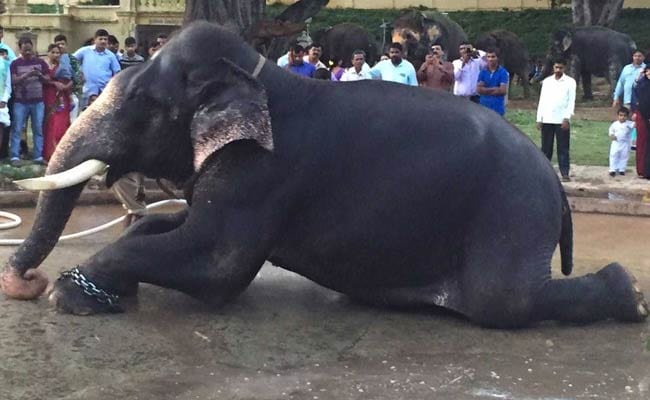Arjuna is dead.
When I first saw the news of the death of this majestic elephant, there was a sense of sorrow. Over several years, I had an annual rendezvous with the magnificent creature at the Ambavilas Palace in Mysuru, Karnataka – as he got ready to play his star role in the famous Vijayadashami procession. We would cover the procession live every year for TV as part of all-India festival coverage on NDTV. As soon as we arrived at the palace grounds, I would walk down to Arjuna’s enclosure to admire him and hope he was coping with the inevitable stress of the situation.
When I learnt of the manner of his death, the sorrow intensified. I had first thought he had died of old age – he was 63 and had been retired from carrying the 750 kg golden Howrah and the idol of Goddess Chamundeshwari during the Dasara procession. However, it wasn’t a peaceful death for Arjuna in his forest home in Karnataka’s Nagarahole forest. He was part of a Karnataka Forest Department operation to tackle a wild elephant in Sakaleshpur – and was killed by that elephant in a fight.
There are pictures of grieving people sobbing on the injured body of the elephant. Chief Minister Siddaramaiah posted on X his sorrow at the news. Thousands of people have seen Arjuna – and his death has affected many.
Mysuru’s royal Dasara tradition goes back centuries. The festival is Karnataka’s nada habba, the state festival. The Vijayadashami procession starts at the Mysuru palace and winds its way through the city. The highlight for thousands who watch the procession is the jumbo savari – the procession of beautifully decorated elephants. The ‘chief’ elephant was given the task of carrying the weighty golden howdah. In the past, the Mysore Maharaja would sit in the howdah. Later, the howdah carried the idol of the goddess Chamundeshwari. The story around the Mysuru Dasara is that Chamundeshwari killed the demon Mahishasura – the origin of the name Mysuru. Mahishasura rode an enormous buffalo, so goes the story, and the Chamundi hill overlooking the city is said to be the body of that buffalo.
The selection of the ambari elephant – the elephant to carry the howdah – had to be a careful one. Arjuna was a risky choice for this role. He had been violent in the past. But on the day of the procession, he always came through, as he had been trained to.
The elephants who are part of the Dasara procession spend most of the year in a forest camp. They are brought in from their forest home in Nagarahole several weeks before the procession – to acclimatise them to city noise and the hard roads. Many voice concern about what the elephants have to go through during it all. The sheer weight of the 750kg golden howdah cannot be easy for the ambari elephants, however strong they are. Add to that, the crowds, the noise, the drumming…
Each year, I would look into Arjuna’s eyes and wonder what he was thinking.
Arjuna was captured as a young eight-year-old from the forests of the Western Ghats. He was trained. At the age of 52, in the year 2012, he was chosen to be the ambari elephant despite worry over his temperament. He made it though, from 2012 to 2019.
He continued to make his annual appearances at the Mysuru Dasara celebrations, and even when he was relieved of the burden of the howdah after he turned 60, he was still part of the procession. This year too, during Vijayadashami in 2023, the veteran made his way from the forests to stay for weeks in the palace grounds and walk through the streets of Mysuru.
I saw Arjuna once in his Nagarahole home too, during a shoot for NDTV’s tiger campaign. He did have a chain around his leg – a ‘working’ elephant can never be said to be totally free. But it was far more soothing to see the tall, dark and handsome Arjuna in the forest than in the urban settings where we usually met. I was allowed to feed him a ragi ball as he towered over me, on the other side of a wooden barricade.
What were you thinking, Arjuna? When you were taken into captivity as a young elephant. During your training. During the long years of Dasara service walking as part of a noisy procession. When you died.
I hope you are at peace now.







